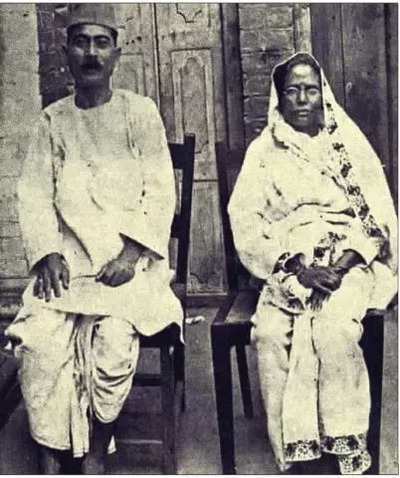

Her name didn’t find a prominent place in the list of women who participated in the freedom struggle, but she was ‘Kaptaan’ (captain),one who led women volunteers during the freedom movement and was even jailed for picketing shops selling foreign goods in Lucknow. Shivrani Devi, wife of legendary Hindi litterateur Munshi Premchand, contributed immensely in the struggle for Independence as well as through her literary works. “Munshi Premchand stayed in Lucknow for around six and a half years from 1924 to 1930 with her two sons, daughter and wife Shivrani Devi. Both Munshi Premchand and Shivrani Devi wanted to go to jail while fighting for the country’s Independence, and it was Shivrani who was jailed for two months,” says eminent critic Virendra Yadav.
She was arrested for picketing shops selling foreign goods on November 11,1930, at Jhandewala Park, Aminabad. “She was always interested in the socioeconomic uplift of the people and actively participated in the freedom movement. What moved her more was the speech and arrest of Swarup Rani Nehrumother of former Prime Minister Jawahar Lal Nehru, at Jhandewala Park during the freedom movement,” says Yadav. “Shivrani’s active participation in all freedom activities made her so popular that when Congress worker Mohan Lal Saxena made a list of women volunteers, Shivrani was unanimously chosen as their ‘Kaptaan’ (captain),” he adds.
“The most interesting thing about her participation in the freedom movement was that even Munshi Premchand was unawareof it. He came to know about it when he found his wife’s name as the Congress’s women wing leader in the list of volunteers which was sent to him for translation into Hindi and Urdu,” says Yadav. A book, titled ‘Life and works of Premchand’ by Manohar Bandopadhyaya which is published by the publication division, ministry of information and broadcasting, has details of Shivrani’s arrest and surging sentiments of the arresting policemen in a touching narrative taken from Shivrani’s book ‘Premchand Ghar Mein’. During Shivrani’s arrest at Jhandewala Park, one of the policemen could not resist his emotions of tribute to these selfless women volunteers who were happily going to jail for the sake of the country. The book quotes her interaction withthe policeman.
“Mataji, we get Rs 23 herebut if anyone offers us even Rs 10 else where, we would happily give up this sinful service”, the policeman had said. Shivrani Devi, who was quite moved by the cop’s statement, consoled him that he was after all performing his official duty. To this, the policeman replied, “You are so generous that is why you are going to jail. It is painful that we are takingour mothers and sisters to jail instead of worshipping them. ”Shivrani Devi did not sit idle after her release from jail and even though her health deteriorated considerably, she organised an active protest against the ill-treatment of C-class prisoners who were inhumanly starved and denied warm clothes during the win ter. The authorities had to finally concede to their demand.
“When Shivrani was arrested, Premchand was in Varanasi. He later visited the jail and told her: “Not you, I am in jail as I have to take care of our children,” says Ravi Kant Chandana faculty at Lucknow University’s Hindi department and a critic.
“Premchand felt that he could be arrested any day after his return from Varanasi. In fact, he had been looking forward to that ‘glorious’ day. He was delighted to see that his wife had taken a lead over him. Premchand had said that she had raised his esteem a hundred times,” he says.
Shivrani had literary talent but she concealed them for quite some time. She published her first story ‘Sahas’ in 1931, which Premchand came to know only after its publication. Her book on her husband, ‘Premchand Ghar Mein’, is a valuable contribution to Premchand’s literature and is a must-have for scholars and researchers.
THE COUPLE CHANGED HOUSE EVERY YEARD
During their stay in Lucknow, the couple kept on changing their house every year since in summer vacation Munshi Premchand went back to his hometown in Lamhi, Varanasi, as they couldn’t afford to waste money on rent when they were back home,” quotes critic Virendra Yadav.
SHIVRANI DEVI’S MARRIAGE WITH PREMCHAND
As quoted in the book ‘Munshi Premchand’ by Madan Gopal, Premchand got married to Shivrani Devi after reading an advertisement in the matrimonial columns of a newspaper from Munshi Deviprasad of Salempur village, in Fatehpur, regarding his daughter who had been married at the age of 11 and widowed three months after the marriage. Premchand sent particulars about his education and his salary. He offered to accept the child widow in wedlock. Deviprasad (Shivrani’s father), an Arya Samaji who had written a pamphlet advocating widow remarriage, sent Premchand a copy of the pamphlet and invited him to Fatehpur, liked him and gave him his fare and a customary gift symbolising commitment. As quoted in the book, Shivrani said, “The marriage did not get the approval of Premchand’s kin. He, therefore, did not even inform them about his wish. His marriage to me, against all conventions, was a bold step. ”
PREMCHAND USED TO TRANSLATE
English use for wife | Shivrani Devi had literary talent but as she could not understand English, her husband, Munshi Premchand used to translate the news published in ‘Leader’, one of the most influential English language newpapers during the British Raj.
SAHAS, STORY OF A GRITTY GIRL
One of her stories, Sahas, sent to the editor of Chand, was corrected by the editor and published in his magazine under her name ‘Shivrani Devi, wife of Premchand’. Sehgal, who sent Premchand a copy which carried an instalment of Pratigya, congratulated the “king of novelists” that his wife had also started writing. “Sahas is the story of a girl who beats up her would-be husband at the time of marriage ceremonies. (quoted from the book Munshi Premchand by Madan Gopal)
FacebookTwitterInstagramKOO APPYOUTUBE






